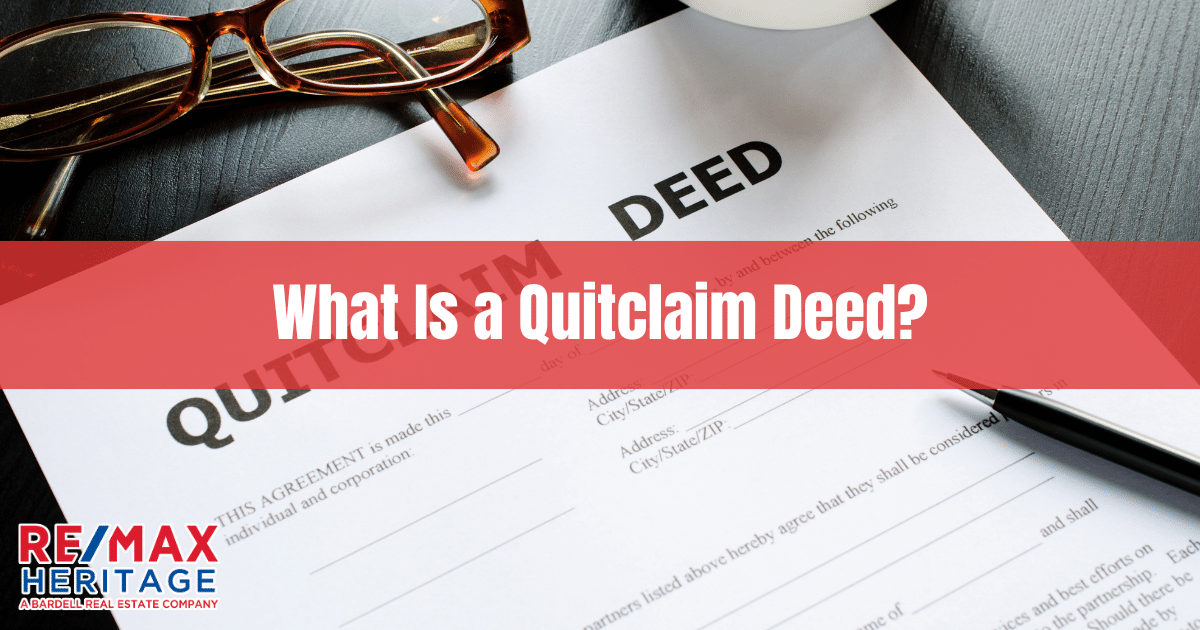What Is a Quitclaim Deed


What Is a Quitclaim Deed
Quitclaim deeds and specific terms may come up if you’re transferring property between family members or spouses.
If you are selling your home now, you may not remember that you signed and received a deed when you purchased your property, such as a warranty deed or quitclaim deed (sometimes called a quick claim deed).
The particular real estate deed provides proof of ownership for the buyer and transfers the title or deed to you, regardless of who the property owner (or co-owner) was before you.
Two types of deeds to transfer ownership of real property
The legal document that transfers ownership of the property can be a warranty deed or a quitclaim deed.
Warranty deed: Used in most real estate sales transactions, this deed says that the grantor (previous owner) is the owner of the property and has the right to transfer the property to you (the grantee). In addition, the deed serves as a statement that there are no liens against the property from a mortgage lender, the Internal Revenue Service, or any creditor, and that the property can’t be claimed by anyone else. Title insurance provides the financial backup to the warranty deed, and requires a title search to verify that no other claims, encumbrances, easements, or liens on the property are outstanding.
Quitclaim deed: Used when a real estate property transfers ownership without being sold. No money is involved in the transaction, no title search is done to verify ownership, and no title insurance is issued. A quitclaim deed real estate transaction sometimes occurs between family members.
Why use a quitclaim deed
Quitclaim deeds are a quick way to transfer property, most often between family members. Examples include when an owner gets married and wants to add a spouse’s name to the title or deed, or when the owners divorce and one spouse’s name is removed from the title or deed. In other cases, a quitclaim deed can be used when parents transfer property to their children or when siblings transfer property to each other.
Some families or parties opt to put their real property into a family trust, and a quitclaim deed can be used then as well.
Another time that a quitclaim deed might be used is when a title insurance company. finds a potential additional owner of a real property and wants to make certain that this person doesn’t make a future claim of ownership.
In that case, the insurance company would ask that person to sign a quitclaim deed.
It is important to recognize that a quitclaim deed impacts only the ownership of the house and the name on the property deed or title, not the mortgage. For instance, in the case of a divorce, if both ex-spouses’ names are on the home mortgage loan, they are both still responsible for the mortgage payments, even if a quitclaim deed has been filed.
Quitclaim deed basics regarding grantors and grantees
The rules about how a quitclaim deed is handled vary by jurisdiction, but generally you need to include the legal description of the property being transferred, the date of the transfer, and the names of the “grantor” and “grantee.”
Not all states require you to record a quitclaim deed, but it’s wise to have the deed signed by the grantor and grantee and notarized in front of a notary public, then copied and recorded at the county recorder or county clerk’s office.
Other elements of a quitclaim deed
While quitclaim deeds can differ by locale, there are common elements to this type of deed. The elements below are what you’ll normally see:
- The title
- The date of execution
- Who the grantor and grantee are
- The habendum, which describes the transfer of ownership rights
- The consideration, which describes what the grantee gives to the grantor in return for the rights
- A legal description of the property
- Notarized signatures
Do you need a quitclaim deed?
It might make sense to use a quitclaim deed if you’re a parent who wants to transfer a home to your children, or if you recently got married, when a spouse wants to add the other to the title of their property.
One of the biggest benefits to using a quitclaim deed is the fact that it avoids title search or title insurance. However, you should note that quitclaim deeds are not used for real estate sales, considering the new owner will not receive any guarantee related to the validity of the title.
How to create a quitclaim deed
First, read up on your county’s requirements. The information is often available online. If possible, get a sample deed form.
Quitclaim deeds must be in writing to be valid, with information including the property, date of transfer, location, and the names of those involved (grantor and grantee). This type of document is typically notarized to be valid.
After the deed has been notarized, copy it and record it at the county’s clerk and recorder’s office. While recording the deed isn’t required by law in all states, it’s advisable in order to protect you from future claims on the property’s title.
Experts in Residential Real Estate in Orlando
If you are BUYING or SELLING real estate it’s quiet often the single most important financial decision you make. For the last 30 years we have helped clients buying and selling property in Orlando and the surrounding areas. Put simply, this means the knowledge and expertise accumulated over this time ensures our clients get the best representation possible.
Our experienced agents will help and guide you through the entire process providing valuable support every step of the way.
Ready to make a Move?
Bardell Real Estate are the experts in helping you with your selling, buying or renting needs near Orlando, Florida. Make your Disney area experience a forever memorable one. Call us now to speak to a real estate agent.
[formlift id=”36911″]
